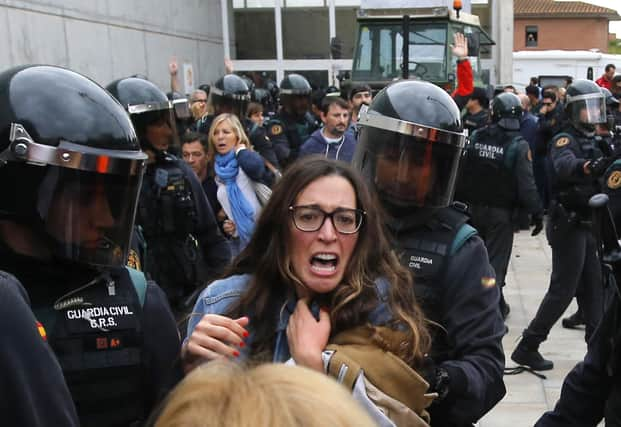Scottish independence referendum: SNP and unionist parties have put Scotland on course for Catalonia style chaos – Alastair Stewart


I worked at Waterstones when I was a student and the company insisted staff push discounted titles at till points. Every bookseller would recognise the false smile and contrite resignation on the First Minister's face this week. It was the same one we had when tasked with hard-selling Fifty Shades of Grey to little old ladies and families.
Nicola Sturgeon has unmistakably been forced to ask the Supreme Court to rule on the legality of holding a new referendum on Scottish independence without a section 30 order from Westminster.
Advertisement
Hide AdAdvertisement
Hide AdFrom the lacklustre launch at Bute House on June 14 to a spate of recent interviews, the First Minister's heart is clearly not in this do-or-die, Davy Crockett-esque approach to Scotland's constitutional Alamo: “You may all go to Hell, and I will go to Holyrood.”
Sturgeon's move has only temporarily silenced hardliners in her party until they realise the same problems remain, which will torpedo their ambitions (again).
If the Supreme Court bid is rejected, the First Minister has promised to turn the 2024 general election into a de facto referendum with a single policy choice: "Should Scotland be an independent country?"
The fixation on getting a vote on the substance of a referendum is the hallmark of the SNP's time in government. If the SNP secured more than 50 per cent of the Scottish vote, the First Minister said she would take that as a de facto referendum result, but the same intractable issues remain.
Alex Salmond led the SNP to fight the 2014 referendum with the most elementary questions unanswered about defence, currency and pensions (to name a few policy areas). Calling for a second vote with no lessons learned about why you lost the first one is flabbergasting arrogance.
The SNP and an entire coterie of spokespeople continue to avoid the detail deficit. An entrenched minority of Yes supporters even respond to calls for specific blueprints about Scotland's future as a unionist conspiracy. Damn your impudence, they argue, Ruritania exists, and we will take you there (but only if you vote Yes).
Sturgeon's government has made great noise but never a unilateral crossing of the constitutional Rubicon. So whose bluff has been called by threats of a wildcat referendum that includes no policies, no particulars and no vision? Animus towards Boris Johnson and the Westminster Tories can only get you so far. Sturgeon is now clearly having to sell something she does not believe in to satiate the hardline, and even moderate elements, of the SNP.
It is more a desperate ploy than a grand strategy. She knows it, and it is a gamble which surely goes against the First Minister's lifetime of political caution.
Advertisement
Hide AdAdvertisement
Hide AdSturgeon has stacked the deck to fail, knowing fine well the Supreme Court will reject Indyref2 and Westminster will continue to deny a section 30 order. Unionist parties will condemn a single-issue general election campaign. Yes campaigners will merely cry foul and say you forced us to these policy hinterlands.
It is an ugly business that seems doomed to transform outrage about a democratic mandate into public protests. Neither side has been this vitriolic before, and neither Yes or No camps are willing to compromise. A unionist boycott of Sturgeon's plans will end with a real bogeyman for the SNP to rail against for years to come.
For all the talk that Scotland stands in solidarity with Catalonia, the SNP have never seriously suggested that the independence drive be conducted by anything other than official means.
Judicial, constitutional and democratic legitimacy are on a collision course in Scotland just as they were before the 2017 Catalan independence referendum. That plebiscite was approved by nationalist members of the Catalan Parliament after the Spanish Parliament continually rejected their calls for one. They, like Scotland, repeatedly returned representatives at elections who called for one despite the dubious question of who could grant and administer a vote.
The Catalan crisis was forced by the Spanish constitution itself, which expressly states in Article 2 that “the Constitution is based on the indissoluble unity of the Spanish nation, the common and indivisible country of all Spaniards”. Any vote on its future was always going to be declared unconstitutional by the Spanish Constitutional Court.
Protests, arrests, political crackdowns and searches, civil disobedience, prosecution and sentencing of civilian leaders, violent clashes, polling station repression and the backlash against Catalans was merciless. Madrid later imposed direct rule on the region for nearly seven months. Both sides believed they had a mandate for their actions.
I was living in Spain at the time. Police violently attacking polling stations was entirely the fault of political leaders who had overstepped. The consensus among many (at least in the notoriously right-wing town of El Ejido) was that the Catalans were ungrateful and unruly and were conducting themselves like bandits.
When challenged about what recourse the Catalans had to decide their constitutional future, I was met with either a shrug of the shoulders or an outpouring of support for the brilliance of the Spanish state. Some went further, placing primacy on unity because the fragility of Spanish democracy was still transitioning (a process begun upon dictator Francisco Franco's death in 1975).
Advertisement
Hide AdAdvertisement
Hide AdOur leaders have no excuse not to learn from the harrowing scenes in Catalonia and what can go wretchedly wrong.
The SNP and the unionist parties have set us all on a course which invites wildfire rage. The tit-for-tat madness of trying to out mandate each other will lead to our collective ruin.
The Catalan vote, held on 1 October, became notoriously known by the numeronym "1-O”. What will happen on "19-O" for Scotland?
Comments
Want to join the conversation? Please or to comment on this article.
